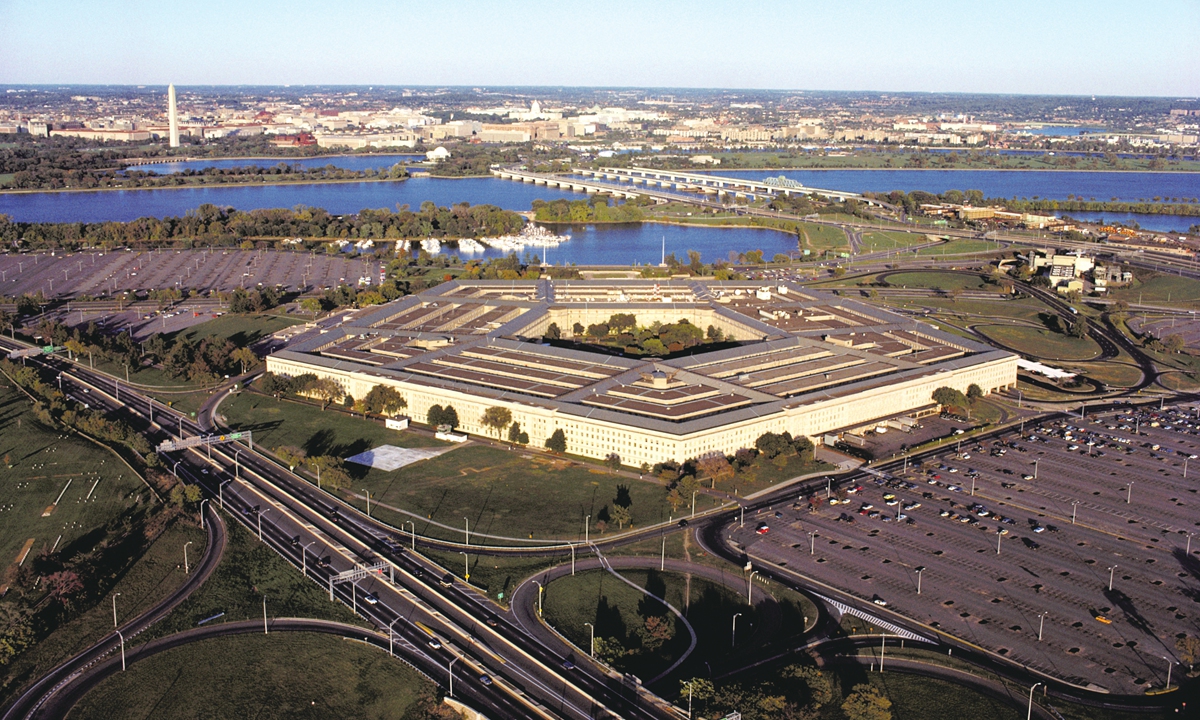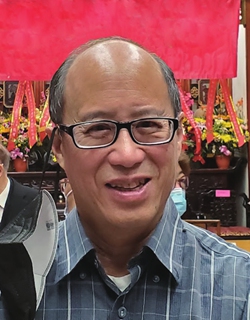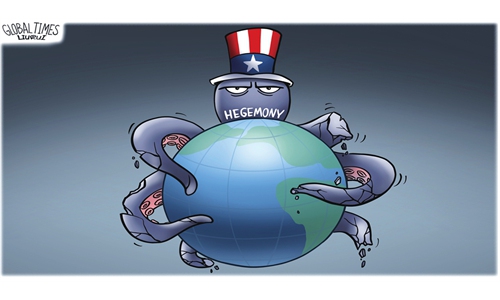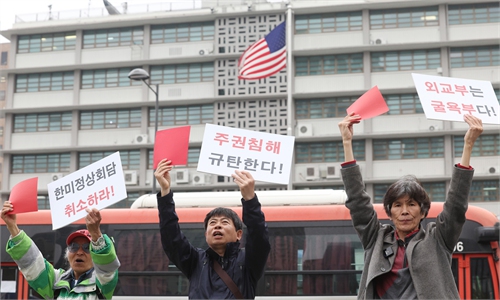
A view of Pentagon. Photo: VCG
Editor's Note:In recent years, it seems we are witnessing a dangerous tendency in US diplomacy: Hawks are increasingly hijacking US' foreign policy, and some even worry that those politicians will dominate it one day. Why does such a phenomenon happen? What are the motives behind it? How does this affect Washington's policy regarding China-related issues, including the Taiwan question? Michael Wong (Wong), the national vice president of the US anti-war NGO Veterans For Peace (VFP), discussed these issues with Global Times (GT) reporter Xia Wenxin.
GT: Several US officials have strengthened their clamor for war against China, with some even saying that the two countries will be at war in 2025. Have hawks dominated US policy toward China?
Wong: Yes, hawks definitely dominate US policy now, including both the Democratic and Republican parties. It began shortly after the end of Cold War with the Project for New American Century, which advocated that the US prevent the rise of any new power that could challenge the power of the US in the way that the former Soviet Union did. The explicit goal is to keep the US remaining as the sole "superpower" dominating the entire planet and keeping all other countries - be they big or small - down. The US has 4.2 percent of the world's population, but its wealthy people holds 25 percent of the world's wealth, and our ruling elite want to keep it that way. In 2021, the top 1 percent of households inside the US held 32.3 percent of our country's wealth, while the bottom 50 percent of Americans held 2.6 percent, and again our super rich elite want to keep it that way. The Project for a New American Century evolved into the Wolfowitz Doctrine, President Obama's "Pivot To Asia," Trump's trade war, and now into Biden's new cold war on China, which threatens to become fully a hot war in the near future.
GT: Are you concerned that the US government will increasingly rely on the US military to carry out its foreign policy? What are the consequences of an overly militarized foreign policy?
Wong: The consequences are many, both foreign and domestic, and we are very concerned. There's an American saying, "If all you have is a hammer, everything will look like a nail." It's well known that the US spends more on our military than the next ten countries combined, including China, Russia, Japan, India, and the most powerful of US allies.
Domestically, this means much less money for American schools, roads, social programs, and all other programs. You can see the effects very graphically just by visiting the US and seeing our big city streets filled with thousands of ragged homeless people, high crime rates, mass shootings, etc. We are creating suffering abroad and suffering at home, all for a ruling elite and their dream of remaining a dominating "superpower." This dream is unachievable, because the earth is simply too big for any one nation - the US, China, or any other nation - to ever dominate it, and thousands of years of history shows that every nation that has ever tried has overextended itself and bought about it's own eventual downfall. This is where the US now finds itself, and with today's nuclear weapons, this unrealistic dream endangers not only our own nation but the entire planet. From ancient times, China has always understood this, and China's vision of a multipolar world in which no single nation dominates and all nations mutually cooperate is the only viable alternative for peace, mutual survival, and mutual prosperity. Historically, this is in fact the natural state of the world. America should work with nature, rather than trying in vain to dominate it.
GT: How do you view Washington's constant provocations against Beijing on the Taiwan question? Is this a symptom of the militarization of the US' China policy?
Wong: Yes, this is a symptom of the militarization of US policy, not only in regards to China, but around the world. In order to remain the lone "superpower" and dominate the world, the US elite want to stop the peaceful economic rise of China. Having failed to do this economically, they turn to America's last card, the military. China's "Anti Access/Area Denial" (A2/AD) defenses are strong enough to defend China against a direct US military attack. But the US elite want to use [island of] Taiwan, Japan, South Korea, Australia, and any other nations they can manipulate, to attack China as US proxies, just like Ukraine vs Russia. The US strategy is to play the various Asian nations against each other to destroy or weaken all. This is the classic colonial period strategy of "Divide and Conquer." They know that China cannot give up Taiwan, part of China since ancient times. They want to push China into firing the first shot, so they can claim China is the "bad guy" for propaganda purposes, particularly with the American and allied publics. But China is strong enough to defend against both the US allies/proxies as well as the US directly, so it's been a complicated game of cat and mouse. This US aggression is utterly immoral and we condemn it. Moreover, the risk of things going wrong and escalating into an out of control war to the nuclear level is very real and dangerous, and Veterans For Peace is absolutely opposed to this.

Michael Wong. Photo: Courtesy of Wong
GT: It is clear that the US and NATO are attempting to prolong the war. But Europe has clearly felt war fatigue. How do you view the future of the Russia-Ukraine conflict?Wong: Militarily, it seems impossible that Ukraine can defeat Russia. Russia has the support of the people in the territories it currently controls, territories that Kiev could never really control, so Russia is likely to keep those territories. President Biden said that his goal is to "bleed Russia," but economically, he is bleeding Europe and NATO. While Europe is suffering a winter without Russia oil, Russia's ruble has actually increased in value after the sanctions, rather than decreased, and Russia continues trade with major markets including China, India, and others as the majority of the world's nations do not participate in the sanctions. It's often been said that the US will fight Russia "to the last Ukrainian," which speaks volumes about the proxy nature of this war. In the US, for the first time the American left wing and right wing joined together in "Rage Against the War Machine" demonstrations which drew well over 1,000 in Washington, DC, a couple of hundred (including myself) in San Francisco, and smaller crowds in other cities in the US. As US and European popular support for the war declines, the only viable solution is a cease fire and negotiations to end the war, the sooner the better. China's efforts here should be praised and supported.
GT: Since VFP has been calling for the dismantling of NATO, can you introduce more about your organization's activities revolving around this matter?
Wong: NATO was originally formed during the Cold War to defend Western Europe from the former USSR. But since the end of the USSR, NATO has continued to expand eastward to the very borders of Russia, in spite of a promise not to do so. The US and NATO also got out of arms treaties which had been a bedrock of peace and stability since the last days of Cold War and after. Now NATO is joining American forces in Asia, to threaten China, in spite of the fact that China is nowhere near Europe and has not threatened anyone there. In other words, the US is using NATO to help the US dominate the world. This is part of the US ruling elite's strategy to keep its wealth and keep the rest of the world down and exploited. It creates instability and ramps up the danger of war around the world, from its current hot war in Ukraine to threatening war on China. Far from a defensive force, NATO is now an aggressive force which has joined America's illegal wars in Iraq, Libra, and elsewhere. Therefore, Veterans For Peace has come out against NATO and has called for its dismantling. This has been included in our statements, speeches, and rallies, and will continue to be among our demands.
GT: The anti-war movement in the US reached its peak during the Vietnam War. How influential is the movement in the US today? What are the main anti-war forces? Can they influence US decisions when war is involved?
Wong: During the Vietnam war when large numbers of conventional American forces were involved in active combat and the draft affected all men, massive numbers of Americans resisted the war in various ways, both in civilian life and as active duty service members. Many of us, including myself, refused military orders and went to jail or into exile.
After the war, the US switched to an all volunteer army, hoping that would produce more obedient troops. This reduced the number of people who had "skin in the game" (direct involvement in combat and the suffering associated with it), which in fact reduced the large number of protesters who came out as the Iraq war dragged on. But the troops, although volunteers, still reacted to the horrors, senselessness, and lack of justification of the war. In 2004, Veterans For Peace helped a small group of recent Iraq veterans who had just completed their military service start a new organization, Iraq Veterans Against the War (IVAW). We and they worked together to build their organization, work with active duty soldiers on their bases, and build resistance within the volunteer military. After the war, IVAW renamed itself About Face: Veterans Against The War. The US eventually found the Iraq war unsustainable due to many factors including military soldiers' resistance, and withdrew our large conventional forces from Iraq. Eventually, even the Afghan war became unsustainable, and the US withdrew there as well.
Now the US is using proxy wars rather than direct US troop wars, Ukraine being the new model of US war.
In other words, US peace movement resistance, while not nearly as large or strong as during the Vietnam war, still is one of many factors limiting US options in attempting world domination. We are less powerful than in the past, but we will continue to struggle for peace and do our part. The much bigger factor, of course, is the resistance of nations around the world, including military, economic, and political resistance, which will eventually tip the balance against empire.


